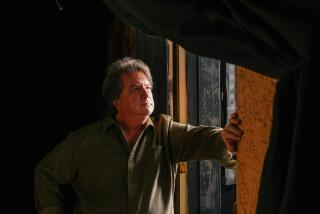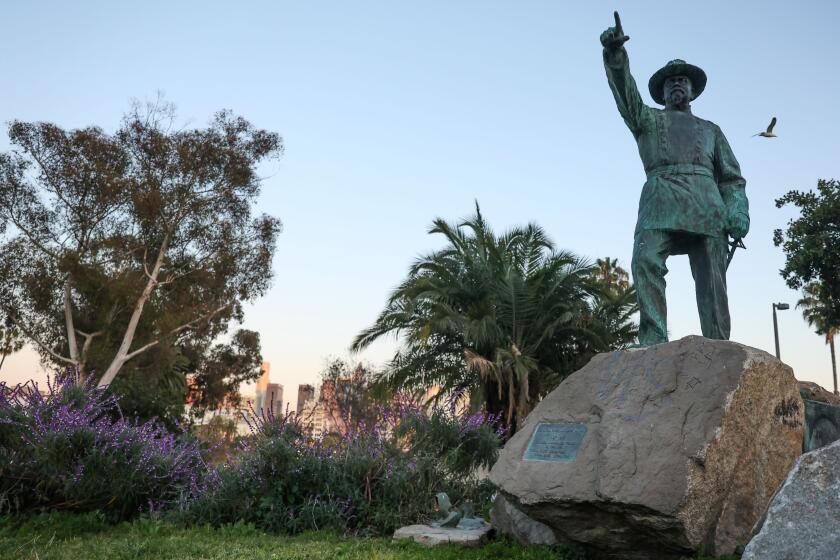Review: Robert Schenkkan’s ‘Building the Wall,’ set in Trump’s America, imagines the unimaginable
How does darkness overtake a nation? The philosopher Hannah Arendt took up the subject in her book “Eichmann in Jerusalem,” which investigated the mystery of how ordinary Germans transformed into murderous Nazis.
The face of evil, Arendt discovered, wasn’t a demon lurking in the cellar but the factory supervisor in the nice house across the street. Those carrying out the orders that led to the extermination of millions of Jews along with other marginalized groups became part of the bureaucracy of genocide. This startling and still controversial insight — that the Holocaust was executed not by sadists but by conformist clerks and self-interested middle managers — inspired the famous subtitle of Arendt’s book: “A Report on the Banality of Evil.”
Robert Schenkkan, the Pulitzer Prize-winning playwright (“The Kentucky Cycle”) who co-wrote the screenplay for “Hacksaw Ridge,” has a new play that explores the concept of the banality of evil in our own backyard. “Building the Wall,” which opened Saturday at the Fountain Theatre, imagines the unimaginable happening in Trump’s America.
In a program note, Schenkkan acknowledges a debt to Gitta Sereny’s “Into That Darkness.” He describes her book as “an attempt to understand the bleakest of the Nazi horrors by focusing on one ordinary man who, for a brief moment, found himself with unlimited power.”
The parallels with “Building the Wall” are clear, but the play was written expressly in response to what Schenkkan sees as the threats posed by Trump’s dangerous rhetoric and his reopening of the “authoritarian playbook,” which calls for the creation of “a constant state of crisis” and the scapegoating of “minorities with appeals to nationalism, racism and isolationism.”
The crisis in the background of this two-character play, directed with unflagging concentration by Michael Michetti, is an incident in Times Square that “irradiated” two square blocks and allowed Trump to impose martial law. The year is 2019, but “near future” might be a more accurate delineation for this terrifyingly plausible work of dystopian fiction.
Bo Foxworth, who appeared in last fall’s South Coast Repertory production of “All the Way,” Schenkkan’s Tony Award-winning drama about Lyndon B. Johnson, plays Rick, the supervisor of a private prison who has been arrested and placed in solitary confinement for crimes that take some time to be revealed. Judith Moreland portrays Gloria, an African American history professor who talks with Rick in a chilly prison meeting room (conjured in all its generic menace by set designer Se Oh). She wants to understand what motivated his actions, and in return she’ll give him an opportunity to tell his side of the story.
The play, which arrives at the Fountain in the first stop in a series of productions set to open across the country as part of the National New Play Network’s rolling world premiere program, unfolds as a conversation between a liberal professor who happens to be a black woman and a Trump supporter who can’t understand why white Christians can’t defend their identity too. The two sniff each other out, challenging ideological assumptions while finding unexpected points of connection, but Schenkkan is less interested in the psychological dance between these characters than in the events that put Rick behind bars.
It may not seem entirely credible that Rick would divulge to a stranger with antithetical political views the dark secrets he tried to keep from his wife, but Schenkkan’s writing rarely hits a false note. Rick’s confession, centering on the detention of immigrants whose legal status is in dispute, builds steadily to a terrifying climax.
The play connects the violent sentiments of political rallies with policies that find an opportunity when chaos strikes the nation. The ratcheting up of the war against terrorism permits the rounding up of immigrants, which leads to the practical problem of how to hold a swelling population that can’t entirely be repatriated. Rick, in charge of one of the detention centers, is beset with managerial problems that become human catastrophes. Harrowing descriptions of the sanitation emergency are soon eclipsed by the graphic misery of the cholera epidemic that breaks out.
The situation only degenerates from there. Step by step, Schenkkan gets us to see the way the collapse of institutions leads to the collapse of morality and the rule of law. “Building the Wall” conjures what appears to be a worst-case scenario, though who would dare presume to know what the worst-case scenario even is anymore?
The acting in this 90-minute, intermission-less production is scrupulously well observed. Moreland, delivering a magnificent performance, finds subtle ways to convey the weight of Gloria’s conscience. The character is obviously a first-class academic, but she’s hardly dispassionate. Her experience as a target of hateful prejudice informs her research.
More to the dramatic point, the depth of Gloria’s responsiveness helps her to understand political views diametrically opposed to her own. She may wince at the faults in Rick’s reasoning, but she recognizes his alienation and powerlessness.
Foxworth neither sentimentalizes nor demonizes Rick, who recounts with blasted neutrality the path from his hardscrabble youth as military brat to his patriotic enlisting in the Army after Sept. 11 to his seduction as a veteran by Trump’s law-and-order message.
Rick isn’t by nature a bad man, but that doesn’t exculpate him of the atrocities committed on his watch. As a character, he may be the incarnation of an idea in a carefully arranged dramatic argument, but Foxworth personalizes the figure just enough for us to believe in his existence — and to wonder about the extent of his complicity.
“Building the Wall,” which would benefit from a touch more variety in the writing, stays on top of the headlines with mentions of Trump’s blocked travel bans and Attorney General Jeff Sessions’ favorable stand on federal use of private prisons. Schenkkan will likely have to do some tinkering to keep the play up to date in future productions. But there’s no denying that this dramatic object lesson is expertly laid out.
Even a lapse at the end into rhetoric, when Rick incongruously stutters into academic speech (“What is a wall? It’s a, a construct, a, a device, for keeping people out”), cannot mar the effectiveness of this expedited theatrical construction. “Building the Wall” should be seen and shuddered over, if only to heighten our collective vigilance.
The theater historically has provided a forum for citizens to contemplate the agonizing issues of the day, and it’s heartening to see Schenkkan and the Fountain respond with such celerity to present dangers.
♦ ♦ ♦ ♦ ♦ ♦ ♦ ♦ ♦ ♦
‘Building the Wall’
Where: Fountain Theatre, 5060 Fountain Ave., L.A.
When: 8 p.m. Saturdays, 2 p.m. Sundays, 8 p.m. Mondays; ends May 21
Tickets: $15-$35
Information: (323) 663-1525 or www.fountaintheatre.com
Running time: 1 hour, 30 minutes
SIGN UP for the free Essential Arts & Culture newsletter »
Follow me @charlesmcnulty
ALSO
A high-jinks-filled ‘Twelfth Night’ at the Wallis
Wait for it: ‘Hamilton’ announces on-sale date for single tickets in L.A.
‘A Wrinkle in Time,’ live onstage: A celestial romp aimed at kids
Gene Kelly’s widow recalls the magic of ‘An American in Paris’
More to Read
The biggest entertainment stories
Get our big stories about Hollywood, film, television, music, arts, culture and more right in your inbox as soon as they publish.
You may occasionally receive promotional content from the Los Angeles Times.







